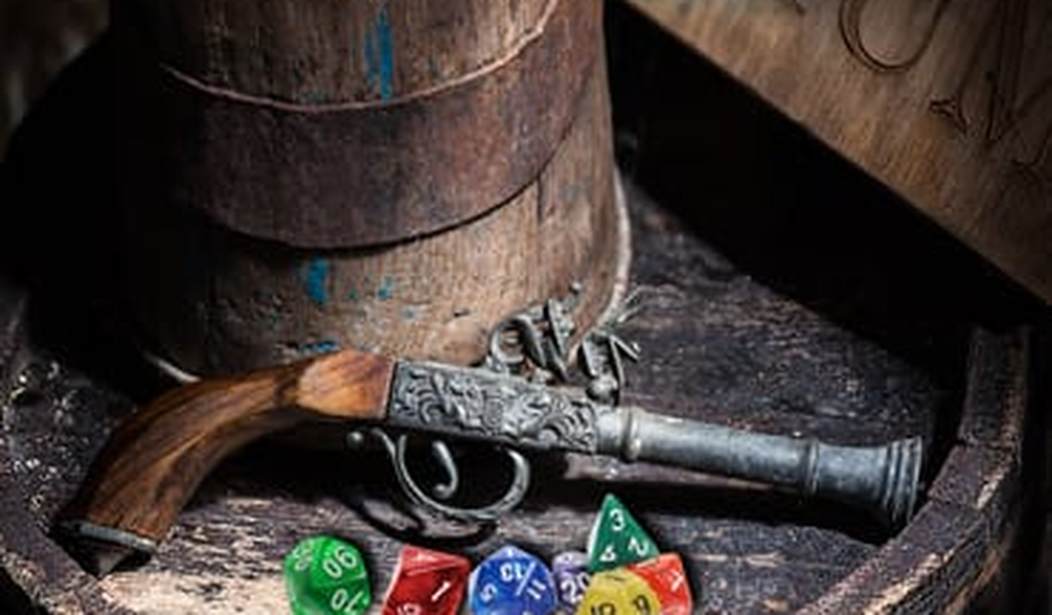So your players want guns in their late-Medieval (or close analogue) roleplaying game (RPG) campaign. Oh, sure, they might talk about parachutes or the printing press or even a slightly less dangerous form of surgery — but it’s really going to be usually about handguns and cannon. Not all players in all campaigns, of course: but eventually it’s going to occur to many player groups that the particular problem that they’re facing could be very usefully solved by shooting at said problem a metal ball out of a metal tube via the use of Dwarven ‘firepowder’ (or ‘burst-seed,’ or whatever alternate name for gunpowder that the campaign book came up with).
The first thing that you should do in this situation, obviously, is to ask if the players really mean it. The classic “Are you sure that you want to do this?” will serve you well here, as it has done so many times in the past: if nothing else, it will provide its usual subtle warning to your playing group that things will not go all their own way if they get their own way. And, obviously, as a gamemaster (GM) you have the absolute right to run a campaign the way that you want to run it*. But if you are inclined to see what happens when you add guns (or another equally disruptive technology) to your world, well, there are compensations for the GM. Like having an entire new way to complicate your players’ lives.
The first thing to remember about technological innovation is this: when it comes to gunpowder — and steam technology, which is another favorite thing that players will want to ‘invent’ — ‘blowing up in your face’ is not a metaphor. It’s what happens when you’re not careful about working with either. The players would probably like the gamemaster (GM) to handwave away that particular issue, of course; and the GM would probably like the players to at least explain the process that they’re using to get their gunpowder. The GM’s likes should probably prevail, there.
The second thing to remember is this: your players will undoubtedly (and possibly smugly) let you know that it’s not actually legitimate to have everybody in the world suddenly rush out to make gunpowder, simply because one group of adventurers in one kingdom are rumored to be shooting up the place left and right. And in historical Europe, this would be broadly correct: it took several centuries before gunpowder weapons (specifically, handguns) really took off. However, if the campaign has any sort of magical element to it at all then there’s probably an existing communications network among the various wizards, sorcerers, sages, seers, priests, and whatnot. And unless the mages and the nobility are utterly at odds with each other then it follows that at least the kings and dukes are going to hear about things rather more quickly. Or possibly even magically ‘see’ them, which probably would start a gunpowder arms race right there.
And that’s when the fun for the GM really starts. There’s nothing like a good diffusion of innovation to start a war or series of wars, particularly when the innovation in question disrupts the existing economic or social equilibrium. And crazy things happen in wars all the time. Wildly outmatched battles. People being in the wrong/right place at the wrong/right time. Mad cults and movements that would never have gotten off of the ground in peacetime. And the utter uncertainty of day-to-day existence itself. I’m thinking of, say, Europe’s Thirty Years’ War**: while it was a tragedy and a disaster for the people who actually had to live through it (or die in it), inflicting some variant of it on your campaign might make for a good campaign climax.
Or you could just say No guns. And when the players ask why point out that it’d disrupt your campaign in ways that don’t seem fun to you. Which is, again, totally your right to do.
*And the players equally have every right to not play in your campaign, so don’t be nasty about it.
**On the one hand, plunging most of an entire continent in war within a decade of gunpowder being introduced does not really fit the historical record (it took at least three hundred years, arguably). On the other hand, Medieval and Renaissance Europe did not have the magical equivalent of a 19th century telegraph network. And on the gripping hand, the party argued that they should get all the way up to flintlocks right away, yes? Rapid technological advances cut both ways.









Join the conversation as a VIP Member